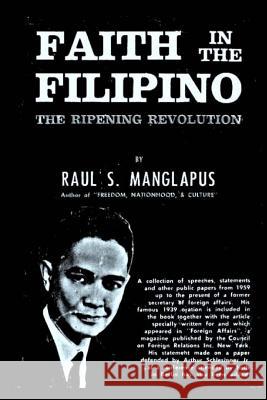Faith in the Filipino » książka
Faith in the Filipino
ISBN-13: 9781542306096 / Angielski / Miękka / 2017 / 130 str.
FOREWORD In 1939, Raul S. Manglapus delivered an oration at an inter-university oratorical contest entitled "Land Of Bondage, Land Of The Free." President Manuel L. Quezon, who was present as the guest of honor, was deeply impressed by it. The oration has now become a classic. Manglapus indicted a system which kept the tao in political and economic bondage in spite of constitutional assurances of liberty. In his peroration, he foretold an aimed peasant revolution if the causes of discontent which he had enumerated were, not promptly removed. The causes were not removed. Six years later his prophecy came true. The peasant struck in Central Luzon. The tragedy was compounded by the fact that the Communist Party succeeded in seizing the leadership of the revolution. To quell the uprising, Ramon Magsaysay put new spirit in the Philippine Army. To prevent a recurrence, he began his own revolution. Twelve years after Manglapus had delivered his indictment and made his prophecy, Magsaysay began to remove the causes of discontent and to dignify the citizen in the barrio. Responding to the need of the hour, his revolution succeeded in turning the eyes of the people away from Mount Arayat and back to Malacanang. Malacanang was returned to the people and the people rejoiced. Yet, raising the hopes of the people and concentrating these hopes on his leadership was not to be the final destiny of the Magsaysay Revolution. He realized that perpetuating such a situation within the framework of an over-centralized government would merely mean that the faith of the citizen would be revived only to be smothered to death by a demoralizing dependence on an officious central government. Thus Magsaysay sought, after turning the hopes of the citizen back to Malacanang, to turn it to the citizen's own self. Before his tragic death, he initiated a program which would mean the ripening of his revolution. The barrio citizens were at last to be given a just measure of self-government, the opportunity to develop their communities by their own effort and to permit their historical self-reliance to contribute its share to national development. In political terms, this meant decentralization of government. In the economic field, this meant complete confidence in private initiative with government incentives. In sum, all this meant a revival of the Faith of the Filipino in himself. He did not live to see the ripening. But a persistent group, the famous "young men" whom he had gathered around him to give vigor, vision and drive to his administration, today continue to fight for its realization. Raul S. Manglapus, one of those men, is today perhaps the most articulate, logical and effective exponent of decentralization and private initiative in the Philippines. What follows is a collection of his speeches from 1959 up to the present. To give the reader the fullest understanding of Mr. Manglapus' political thinking, the short talks given in Berlin and New Delhi, his statements, and other public papers in the same period have been added. Included also is the article written upon the invitation of the editors of Foreign Affairs magazine which is reprinted here by special permission of its publislters, the Council On Foreign Relations Inc. New York. This book is a sequel to Mr. Manglapus' first collection of speeches, "Freedom, Nationhood, and Culture" Published in 1959. His famous 1939 oration "Land of Bondage, Land of the Free" is also included as an appendix to complete the inspiring story of "Faith in the Filipino - The Ripening Revolution." + + + + + + ABOUT THE AUTHOR Raul Manglapus y Sevilla is known for many things. At the age of 38 he was the youngest Filipino ever to hold the Office of Socretary of Foreign Affairs. At 35 he already held under the Magsaysay administration the very sensitive end demanding office of Foreign Affairs Under-secretary. Since then, even as a private citizen, he has been Invited by the governments of (See inside bo
Zawartość książki może nie spełniać oczekiwań – reklamacje nie obejmują treści, która mogła nie być redakcyjnie ani merytorycznie opracowana.











